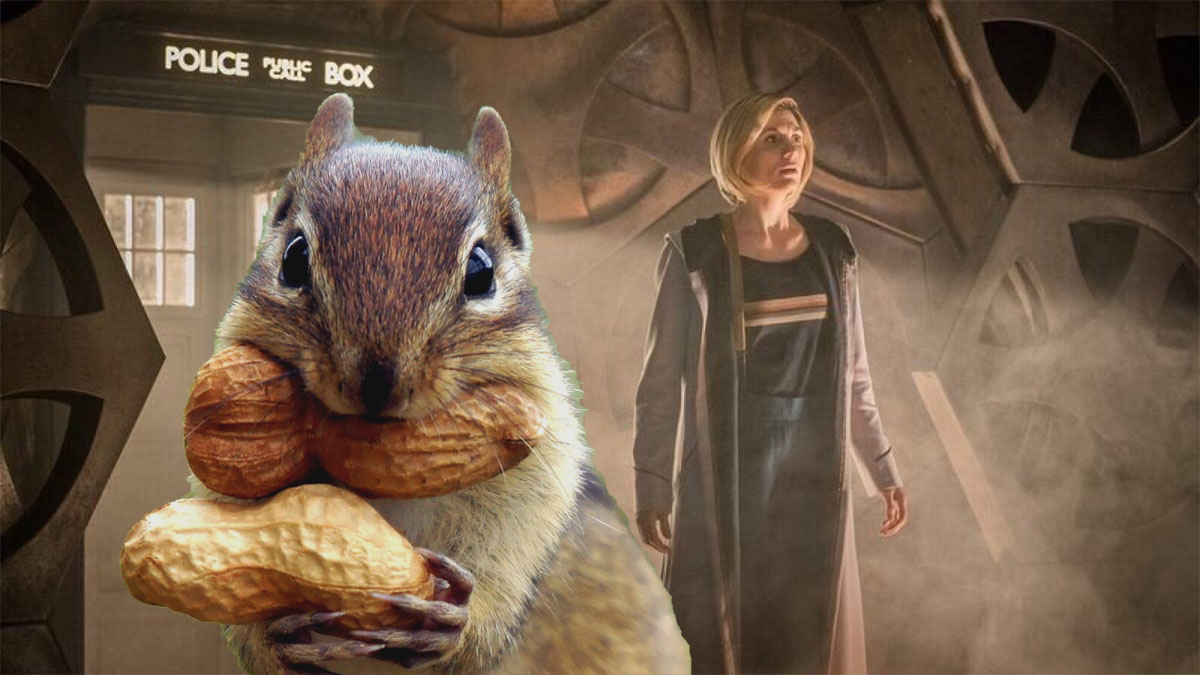Doctor Who series 11: The Battle Of Ranskoor Av Kolos review
Team TARDIS find themselves embroiled in the aftermath of interplanetary war in this eleventh series finale
This section of the review is free of spoilers. If you venture below Daphne the spoiler-squirrel, beware…
11.10 The Battle Of Ranskoor Av Kolos
Cor, these spoiler-free bits can be tricky sometimes. There’s so much to say – about the nature of conclusions, about character arcs that have been building successfully and ones that have withered on the vine, and yet… spoilers, all of it. Lurid, cavorting spoilers rocking global hypercolour t-shirts with vuvuzelas and Nokia ringtones! Run for your lives!
Suffice to say that if you’ve yet to dive into this year’s final episode, it’s not one that’s going to pull the rug out from under your feet when you watch. Stakes are raised, as you might expect, compared to what’s come before. Favoured characters grow and develop emotionally while others continue to demonstrate the same shortcomings they have done all year. As stories go it doesn’t feel much like the end of a chapter, but then the festive special’s basically three food-stuffed weeks from now, so perhaps that’s for the best. There are clumsy lines here and there, but there’s some great dialogue that really hits home, too.
In short: The Battle Of Ranskoor Av Kolos is the culmination of this year’s Doctor Who being precisely the sum of its ten parts – in its tone, in the intimacy of the threat, and in the messages it wants to convey. This is not an episode that seeks to provide you with an emotional epiphany – it’s just here to offer a quick hug that’ll see you through Christmas.

From now on, here be spoilers.
It’s strange to think about in hindsight, but an odd combination of circumstances meant that, when Russell T. Davies took the helm of Doctor Who at the time of its revival, real life tended to write the endings. We can only speculate, had Christopher Eccleston agreed to another run of episodes, how The Parting Of The Ways might have concluded once Rose had had the Time Vortex snogged out of her. As it was, we were bidding the Ninth Doctor a goodbye before we’d really come to know him, and that became what the story was about.
The year after that, it was Rose’s turn to leave. Then Martha, Donna, the Tenth Doctor himself… Yes, it’s true that the fate of the world (not to mention the universe) was on the line in the first five series finales to the point that the threat became a cliché, but the cast changes meant that there could be a real, weighty cost to saving the world. Characters got broken, to the point that they couldn’t travel with the Doctor any more.
With no regeneration and no companion exodus to act as a lens for this finale’s plot, it was a very different kind of final episode – more akin to the classic era of the show. Back in the day, the end of a season often meant nothing more than a break in transmission before the next story, rather than universe-ending apocalypses – not that Chibnall and his creative team have shown much of an interest in that sort of melodrama anyway.
That said, there was definitely more for the Doctor to fight for tonight, and everything was that much bigger in scope. The entire planet Earth came under threat, for starters, briefly imperilled as it was by a Stenza superweapon – admittedly one that takes so long to do the job, even the Starkiller Base designers might consider it ‘needlessly showy’. There were more new alien races to juggle, too.
Unfortunately, the ‘more is better’ approach extends to the number of hi-tech gizmos and ideas on the table, and while we’re told they’re all extremely important, a number of them feel more like plot-hole plasters rather than vital additions. Everyone gets to wear a communication device, for instance, but Graham and Ryan ignore theirs even when they come face-to-face with a Cyberbot army – information the Doctor would probably find pretty handy. When Yaz does remember to use her ‘police radio’, she’s immediately and brusquely shot down by the Doctor, who tells her she’s busy. (Yaz has been taking the brunt of the Doctor’s rudeness all year, and should probably sabotage the custard cream dispenser or something until she gets an apology.)
Likewise, the neural blockers are built up as being a big deal, to the point that when Yaz and the Doctor agree to give theirs up and thus save Earth from getting the Brainiac treatment, we can’t help but believe that it’s a sacrifice which will have serious repercussions for their long-term sanity. We’re primed to expect hallucinations and amnesia; we predict we’re going to be forced to watch two people fighting to keep their self-control. As it is… the Doctor gets a bit of a headache and so they put the blockers back on again five minutes later. Oh.
The same applies to Captain Paltraki’s crew of highly-trained soldiers, who immediately bugger off when freed from stasis rather than join the fight in a meaningful way that, dare we say, might have added some bombastic action sequences to this final episode. They’re throwaway plot points that ultimately make the main story quite confusing because they’re given just as much importance as the things that actually do matter, like the crystalline planet-pack strapped to the Doctor’s back.
The central plot, as a result, gets a bit muddied by unanswered questions. Tim Shaw, we’re given to understand, faceplants on an Ux homeworld several thousand years in the past rather than back in his living room as the Doctor had intended, and is able to convince the duo he’s their long-lost deity. At Tim’s bidding, Andinio and Delph construct a weapon capable of stealing, shrinking and storing all of the planets that have ever stuck two fingers up at the Stenza, killing the inhabitants in the process – a galactic version of the Master’s Tissue Compression Eliminator, if you like.
As a result, a confederacy send their battle fleet to the source of the attacks only to get demolished by… something. But what? There’s a lot we’re left to piece together, thanks to the psychotropic amnesia on Paltraki’s part. We can assume, for example, that the Ux downed all of these ships, and that Paltraki managed to recover one of the pint-sized planets before losing his memories. We can also assume that these signals were deliberately designed to lure the Doctor, and that Tim was waiting for her arrival rather than Earth just happening to be next on his to-do list. These are pretty crucial motivations to help set Mr Shaw up as the master manipulator, but they get a little lost when everything starts kicking off at once.
When it comes to examining motivations, we get an unexpected calling-out of a character who’s gone largely unchallenged so far this year; tonight, the Doctor was confronted about her hypocrisy as regards guns, violence and killing. For once, she doesn’t have a good answer. This is a subplot that’s been bubbling under for a while. Whittaker’s regeneration has been particularly sanctimonious as to how her companions are expected to behave around firearms, even while she’s strapping grenades to her backpack. It’s quite telling that she unconvincingly tries to blag her way through the conversation, because it’s an issue the show itself has been wrestling with from the get-go.
Fifty-five years after William Hartnell considered braining a caveman with a rock, the Doctor has yet to truly come to terms with the idea that a good person can legitimately have blood on their hands, and tonight’s episode really doesn’t help solve the quandary. True, Graham doesn’t kill Tim Shaw, but he does shoot him in the foot to disable him. The guns were as vital here as they were when the Doctor used Wilf’s pistol to prevent Gallifrey’s return. And just like with the spiders left to starve in a vault beneath a hotel, you have to wonder: is condemning the Stenza leader to an eternity buried in a floating rock truly more kind than ending his existence? Or is it just easier to live with?
When everything’s stripped down to the essentials, we’re left with a story that sees the Doctor forced to confront the consequences of her compassion, only to later realise the true scale of the damage her actions have caused. In fact, Tim Shaw might well have asked the Doctor the same question once levelled by a Dalek Emperor – killer, or coward? This time, it falls to Graham, with Ryan’s aid, to answer. He gets his long-awaited fist-bump this week, though the tenderness of the moment is slightly soured given that they’re both posing atop a toppled, murderous alien warlord.
This series of Doctor Who has been described, sometimes in these very reviews, as lacking the complexity of previous years, so it may seem strange if we complain that there were too many ingredients in tonight’s episode. Let’s be clear: for some, the new-found focus on ‘simple’ sci-fi problems, like a marauding Pting or giant spiders, are a very good thing. Not everyone wants to sit down with their family and have to unravel half-a-dozen temporal paradoxes for their weekend entertainment, and this year’s approach has allowed those fans to reconnect with the show.
For others, particularly those who watch a lot of sci-fi, Doctor Who is a format that will always be for everybody, but also regularly offers up uniquely weighty ideas and concepts. After all, ‘family’ isn’t the same as ‘just for kids’. Tonight’s story was definitely not simple, but it also wasn’t complex – rather, it was complicated, taking us through more steps than was necessary to reach the ending. Beneath the fuss, though, this was a solid conclusion to a deliberate, methodical reinvention that stayed true to the values it’s established this year as well as a few of the themes that have bubbled for far, far longer than that.
Now that this all-new cast and crew have the benefit of a full run under their belts, here’s hoping they’ll build upon their accomplishments and find ways to iron out the kinks in those parts that haven’t worked so well. New Year’s Day notwithstanding, it seems they’re taking at least twelve months to figure out how…
